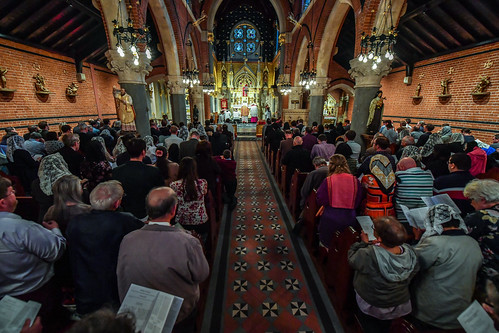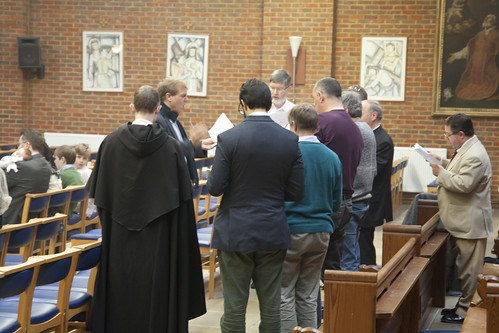Chairman's Blog
The mysterious teaching union that doesn't want to teach
My latest on LifeSite.
Support the Latin Mass Society
Another chat with Fr McTeague: On Criticising Fellow Catholics
 |
| Spot the sinner! Can you see him? If there is one there, clearly this is no place for respectable Catholics. Cardinal Burke celebrates Mass in Corpus Christi Maiden Lane, London. |
Last evening I was interviewed again for The Catholic Current, a radio show hosted by Fr Robert McTeague SJ (a good one).
Our theme was an article I posted on Rorate Caeli and here, 'On Criticising Fellow Catholics'.
As regular readers will know I'm not against criticising people. My specific concern was the tendency on social media to divide Catholics into segments according to their views or preferred liturgy, and to make catty generalisations about them on the basis of isolated personal experiences: most often taking the form 'I went to that Mass once, and I felt uncomfortable because of what someone said to me afterwards'.
An important point here is that obviously there are sinners in the congregation and obviously the clergy and others should not chuck them into the street for breaking 'message discipline': nor yet lock them in the broom cupboard whenever a potential new recruit hoves into view.
You can listen to our chat here:
Spare a thought for Church musicians
 |
| A professional singer, Dominic Bevan (facing right), leading a training choir during the Latin Mass Society's Chant Training Weekend in 2019. |
The excellent article on church music by Matthew Schellhorn in the new Catholic Herald, who among other things is the Latin Mass Society's London Director of Music, prompted me to write on a related subject for LifeSite.
----------
DIY First Holy Communion in Ireland
The parents of ten pupils took up the offer of a virtual Communion. It gave me a real sense of what the early Catholic church must have been like, when people gathered for mass in each other’s homes.
Support the Latin Mass Society
Prepare carefully for post-lockdown Holy Communion
My latest on LifeSite.
And when he is come, he will convince the world of sin and of justice and of judgment. Of sin: because they believed not in me. And of justice: because I go to the Father: and you shall see me no longer. And of judgment: because the prince of this world is already judged. (John 16:8-11)
By these words, which were spoken shortly before his passion, our Savior does more than tell us of the coming of the Holy Ghost; he also shows us how terrible this coming will be to them that have rejected the Messias.
The Summer Mass of Ages is here!
Also in this issue: • Joseph Shaw asks: Why is the Traditional Movement stronger in some places than in others? • Paul McGregor explains how the Traditional Mass returned to Culiacan, Mexico • Maurice Quinn tells the history of Dorset’s ‘Little gem’ – Our Lady of Marnhull • Clare Bowskill shows how the Traditional Mass online was the norm for us all this Easter • Charles A. Coulombe on fire and water – and ghost stories • Joseph Shaw on the Coronavirus epidemic and the liturgical reform • Lucy Shaw reports from the Guild of St Clare Sewing Retreat held earlier this year.
Video interview with CTS
Pierpaolo Finaldi, Director of the Catholic Truth Society, interviewed me by Skype on the booklet by me which they have published: 'How to Attend the Extraordinary Form'.
The booklet can be purchased here.
German bishops repent of the past, but not of the present
Inasmuch as the bishops did not oppose the war with a clear ‘no’, and most of them bolstered the (German nation’s) will to endure, they made themselves complicit in the war. The bishops may not have shared the Nazis’ justification for the war on the grounds of racial ideology, but their words and their images gave succor both to soldiers and the regime prosecuting the war, as they lent the war an additional sense of purpose.
Support the Latin Mass Society
A dialogue with a trans advocate
My latest on LifeSiteNews.
Holy Communion in a plastic bag?
My latest on LifeSiteNews.
It’s absolutely not possible, God deserves respect, you can’t put him in a bag. I don’t know who thought this absurdity, but if it is true that the deprivation of the Eucharist is certainly a suffering, one cannot negotiate how to receive communion. We receive communion in a dignified way, worthy of God who comes to us.

